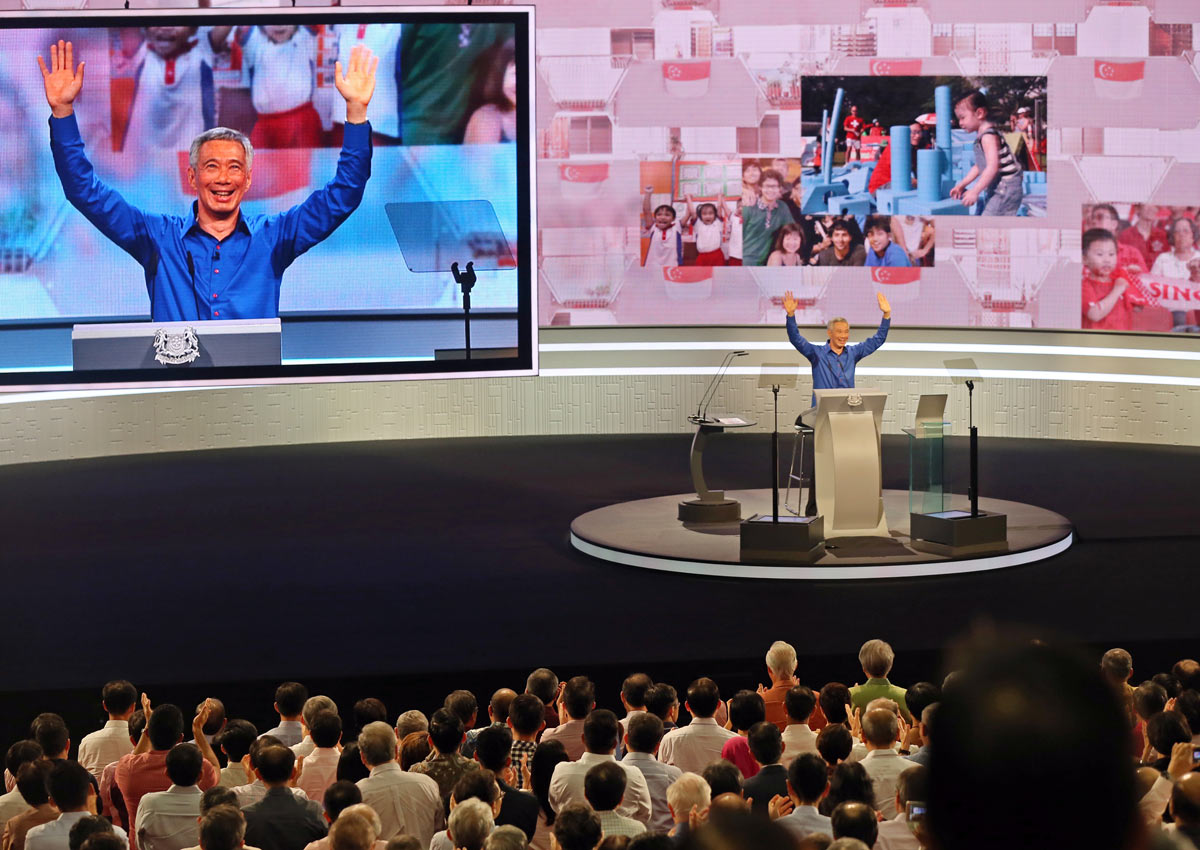Planning ahead has long been the hallmark of Singapore politics, and the country is known for identifying political leaders far in advance.
When founding prime minister Lee Kuan Yew passed the baton to his successor, Mr Goh Chok Tong, in 1990, the leadership handover was a low-key, efficient affair.
It was the same when Prime Minister Lee Hsien Loong took over in 2004.
But in a year of political disruptions around the world that has brought into sharp focus the risks and challenges of power transitions, Singapore was, in a little sense, not spared from a small disruption of its own.
Health scares to PM Lee and Finance Minister Heng Swee Keat, touted as one of the front runners to take over from him, sent ripples of concern through political circles here.
Three hours into his National Day Rally speech on Aug 21, Mr Lee, 64, sent hearts racing all over Singapore when he paused, then faltered and could not continue with his speech.
TV cameras filming the live telecast quickly panned away as his fellow Cabinet colleagues and security officers rushed on stage to help him.
Doctors later said he had suffered from vasovagal syncope, a fainting spell caused by a fall in blood pressure because of dehydration or standing too long.
This happened just three months after Mr Heng, 55, had collapsed from a stroke on May 12 during a weekly Cabinet meeting.
Mr Heng underwent emergency surgery on the same day to seal a ruptured aneurysm in his brain, and has since recovered.
Read Also: National Day Rally suspended after PM Lee appeared to be taken unwell
PM Lee recovered after resting for an hour, and resumed his speech.
It was no surprise that leadership succession was on his mind, and instead of continuing where he had left off, he said: “After what happened, I think it is more important that we talk about it (succession) now.”
While far from the scale of disruptions such as the United States presidential election and the political scandal in South Korea, the two episodes here this year still sparked jitters.
They brought into sharp focus the urgency of succession planning in Singapore, and were a reminder that even the best-laid plans can run into snags.
Read Also: Dear PM Lee, rest more and get well soon, say well-wishers
Some disruptions, like health scares, are unavoidable.
Mr Lee himself had said after returning to the stage that night: “We have got the core team for the next generation in Cabinet. But ministers or not, all of us are mortal.”
As it is, with elections becoming more hotly contested, the leadership renewal process has become less predictable as potential leaders must first be elected.
Minister for Education (Higher Education and Skills) Ong Ye Kung had been identified as a potential fourth-generation leader when he was fielded in the 2011 General Election by the People’s Action Party (PAP).
Read Also: Finance Minister Heng Swee Keat suffers stroke
But his team in Aljunied GRC lost to the Workers’ Party.
He was elected to Parliament last year, four years after his peers.
Political watchers have noted that the next generation of leaders will have had less time to learn the ropes by the time they take over.
Mr Lee has said that he will step down shortly after the next general election, which is due by April 2021.
Read Also: Finance Minister Heng Swee Keat was lucky to get immediate attention
Current ministers identified as core members of the fourth-generation leadership, apart from Mr Heng and Mr Ong, are labour chief Chan Chun Sing, Social and Family Development Minister Tan Chuan-Jin and National Development Minister Lawrence Wong, who have been in politics since 2011, as well as Minister for Education (Schools) Ng Chee Meng, who was elected last year.
Mr Wong, Mr Ong and Mr Ng also did not get voted into the PAP central executive committee at party elections earlier this month.
The process of leadership changes in Singapore has been honed almost to an art.
But fourth-generation leaders do not have the benefit of a long runway. PM Lee, for instance, had been in politics for 20 years by the time he took on the premiership.
Read Also: Heng Swee Keat’s condition stable, will stay in ICU for some time: PM Lee
But what the next batch of leaders are getting is a chance to move through and be rotated among different ministries, directing and dealing with policies.
How this hothousing pans out remains to be seen.
Still, it is too early to argue whether changes need to be made to the process of how leaders are brought into government in future: Directly appoint industry veterans and tested private-sector entrepreneurs? Tap top civil servants and experienced community leaders?
But whatever the case, and whatever the need, it is clear that Singapore will not be averse to making adjustments long before the need arises.
The Government and leaders have indicated as much: that systems and processes here will evolve and adapt to deal with the country’s needs, as new economic, social and political problems and challenges emerge.
And therein lies the value of being open, adept and flexible in any period of disruption: The country has the ability to react quickly and remain in control of the process and its own destiny – and not allow disruptions to take control.
yuenc@sph.com.sg

This article was first published on December 23, 2016.
Get a copy of The Straits Times or go to straitstimes.com for more stories.






